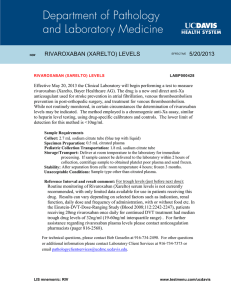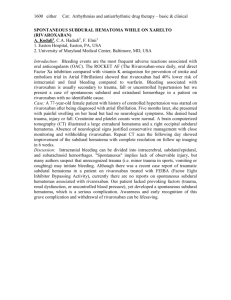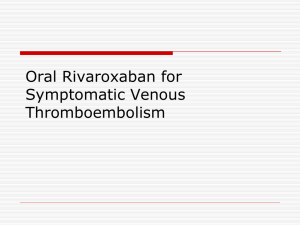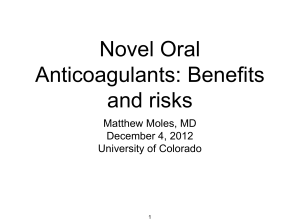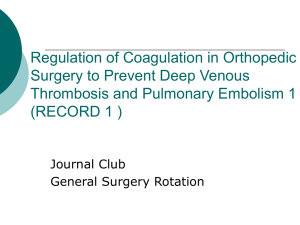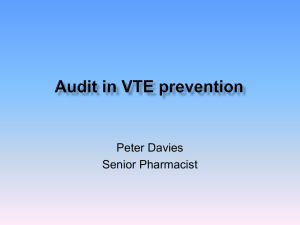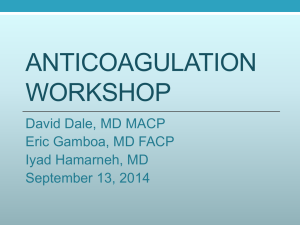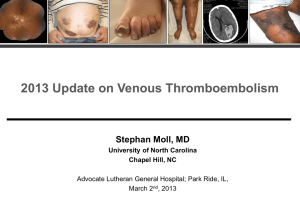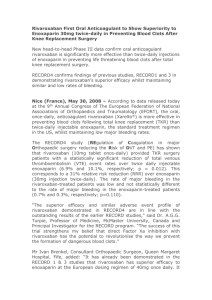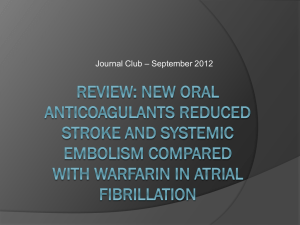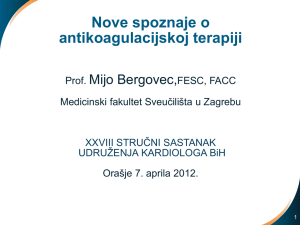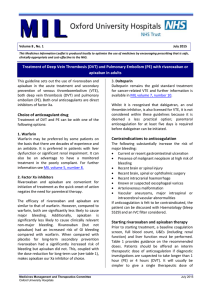Rivaroxaban Counselling Guidelines
advertisement
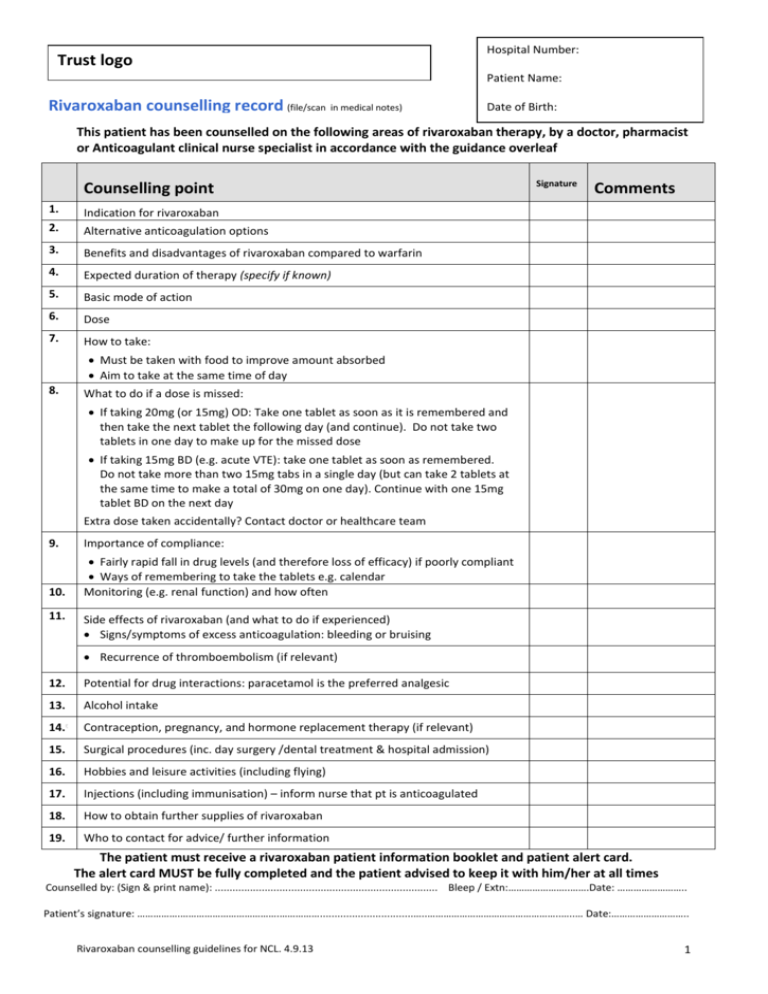
Trust logo Hospital Number: Patient Name: Rivaroxaban counselling record (file/scan in medical notes) Date of Birth: This patient has been counselled on the following areas of rivaroxaban therapy, by a doctor, pharmacist or Anticoagulant clinical nurse specialist in accordance with the guidance overleaf Counselling point 1. Indication for rivaroxaban 2. Alternative anticoagulation options 3. Benefits and disadvantages of rivaroxaban compared to warfarin 4. Expected duration of therapy (specify if known) 5. Basic mode of action 6. Dose 7. How to take: Signature Comments Must be taken with food to improve amount absorbed Aim to take at the same time of day 8. What to do if a dose is missed: If taking 20mg (or 15mg) OD: Take one tablet as soon as it is remembered and then take the next tablet the following day (and continue). Do not take two tablets in one day to make up for the missed dose If taking 15mg BD (e.g. acute VTE): take one tablet as soon as remembered. Do not take more than two 15mg tabs in a single day (but can take 2 tablets at the same time to make a total of 30mg on one day). Continue with one 15mg tablet BD on the next day Extra dose taken accidentally? Contact doctor or healthcare team 9. Importance of compliance: 10. Fairly rapid fall in drug levels (and therefore loss of efficacy) if poorly compliant Ways of remembering to take the tablets e.g. calendar Monitoring (e.g. renal function) and how often 11. Side effects of rivaroxaban (and what to do if experienced) Signs/symptoms of excess anticoagulation: bleeding or bruising Recurrence of thromboembolism (if relevant) 12. Potential for drug interactions: paracetamol is the preferred analgesic 13. Alcohol intake 14. Contraception, pregnancy, and hormone replacement therapy (if relevant) 15. Surgical procedures (inc. day surgery /dental treatment & hospital admission) 16. Hobbies and leisure activities (including flying) 17. Injections (including immunisation) – inform nurse that pt is anticoagulated 18. How to obtain further supplies of rivaroxaban 19. Who to contact for advice/ further information The patient must receive a rivaroxaban patient information booklet and patient alert card. The alert card MUST be fully completed and the patient advised to keep it with him/her at all times Counselled by: (Sign & print name): ............................................................................ Bleep / Extn:…………………..…….Date: …………………….. Patient’s signature: …………….……………………………….……………................................…..…………………………………………..…..… Date:……………………….. Rivaroxaban counselling guidelines for NCL. 4.9.13 1 Rivaroxaban Counselling Guidelines Provide patient with the Xarelto patient information booklet and go through it with him/her, ensuring that the points below are covered. Complete the patient alert card -if unsure of any sections, check with the doctor. The patient alert card should be kept with the patient at all times. 1. Indication: licensed for: (a) Prevention of stroke and systemic embolism in adult patients with non-valvular AF with additional risk factors (b) Treatment of DVT/PE (c) prevention of recurrent DVT/PE in adults. 2. Alternative anticoagulants: warfarin (and other oral vitamin K antagonists), low molecular weight heparin (e.g. dalteparin), other newer oral anticoagulants (e.g. dabigatran, apixaban). For AF, rivaroxaban was shown to be as effective as warfarin for the prevention of stroke and systemic embolism, with a similar rate of major bleeding, but with a lower risk of intracranial haemorrhage. There was a higher rate of GI bleeding, epistaxis and haematuria with rivaroxaban compared to warfarin. For the treatment of acute DVT /PE: rivaroxaban was shown to be as effective as warfarin (plus initial SC enoxaparin) in preventing symptomatic recurrent VTE, with a similar (DVT trial) or lower (PE trial) rate of major bleeding. 3. Advantages (vs. warfarin): fixed dose, no routine coagulation monitoring, more stable anticoagulation control, lower risk of intracranial haemorrhage (AF pts); Disadvantages (vs. warfarin): unable to routinely monitor coagulation, not as easy to reverse compared to warfarin (no formal drug antidote), limited long-term data 4. Expected duration of therapy – if unsure, check with Doctor. 5. Basic mode of action: belongs to a group of medicines called antithrombotic agents; blocks a blood clotting factor (factor Xa) and thus reduces the tendency of the blood to form clots. 6. Dose: Non-valvular AF: 20mg OD*; Acute VTE: 15mg BD for 3 wks, then 20mg OD*. *review dose if CrCL 15 - 49mL/min see SPC 7. How to take: For rivaroxaban doses > 15mg, the dose must be taken with food to improve absorption; aim to take at the same time each day. 9. Compliance: Rivaroxaban has a shorter half-life than warfarin and efficacy more likely to be affected if poorly compliant. 10. Monitoring: the dose will need to be reduced / stopped if renal function deteriorates. Frequency of monitoring depends on the level of renal function and may vary from minimum 3monthly to 6-12monthly. Also, FBC and LFTs, minimum annually 11. Side effects of rivaroxaban (and what to do if experienced) For VTE patients: recurrence of thromboembolism: contact doctor if original symptoms recur Bloody stools or urine, nose bleeds (lasting for > 5-10mins or if pt does not usually suffer from nose bleeds), blood shot eye, coughing or vomiting blood, severe or spontaneous bruising, unusual headaches, excessive vaginal bleeding, cuts that take longer than 5 minutes to stop bleeding. Seek medical attention. If involved in major trauma, suffer a significant blow to the head or are unable to stop bleeding – seek immediate medical attention Any other side-effects: discuss with GP or anticoagulant clinic 12. Potential for drug interactions: may be affected by some medicines / herbal preparations (see SPC for Xarelto ). Therefore: Patient should always let doctor/dentist/pharmacist know that s/he is on rivaroxaban Not to take aspirin unless prescribed by doctor, as increased risk of bleeding ( - combination to be reviewed; will need GI protection). Avoid OTC painkillers such as ibuprofen, aspirin, diclofenac etc (paracetamol is preferred) If admitted to hospital, to inform staff that s/he is taking a new oral anticoagulant (to avoid duplication of therapy with standard VTE thromboprophylaxis). 13. Alcohol intake: alcohol is not expected to affect rivaroxaban levels per se. However, excess alcohol consumption and binge drinking are generally not advised for anticoagulated patients, due to the risks of alcohol associated acute injuries (e.g. head injuries) and chronic liver disease (which may affect coagulation). 14. Contraception, pregnancy, and hormone replacement therapy (if relevant): Women should not become pregnant nor breast feed whilst taking rivaroxaban. Reliable contraception is required. If patient is currently taking HRT/OCP then discussions are required regarding stopping or appropriate choice (generally avoid oestrogen-containing preparations; progesterone only ones are preferred). For women taking rivaroxaban who may be pregnant, discussion with the Haemostasis SpR is required ASAP so that pt can be seen by a haematologist / obstetrician for discussion re potential implications. If planning to become pregnant, then pt should discuss with GP for onward referral to a haematologist. 15. Surgical procedures (including dental treatment) and hospital admission: patient must inform healthcare professional that s/he is taking rivaroxaban especially as (1) patient will need management of anticoagulation around procedures and (2) VTE thromboprophylaxis (e.g. LMWH) is often prescribed on admission to hospital. 16. Hobbies and leisure activities: avoid contact sports (e.g. boxing) and other higher risk sports (e.g. skiing and horse riding), as increased risk of bruising/bleeding. Inform Dr/anticoagulant clinic if flying in the near future. 18. Obtain further supplies of rivaroxaban from the hospital (or GP once care transferred). Not to run out of supplies, especially when on holiday. 19. Further advice/info from local A/C clinic, GP, Hospital pharmacy medicines info dept or in an emergency, A&E dept 2
